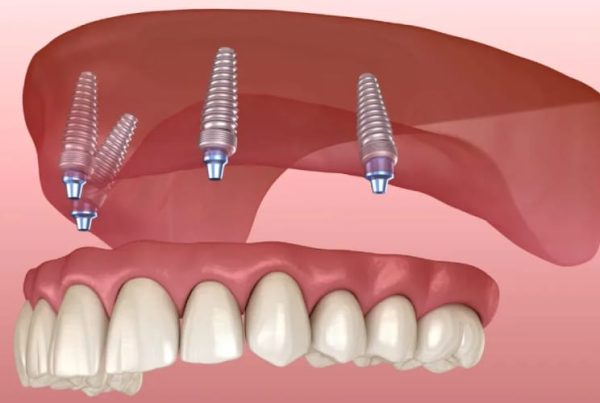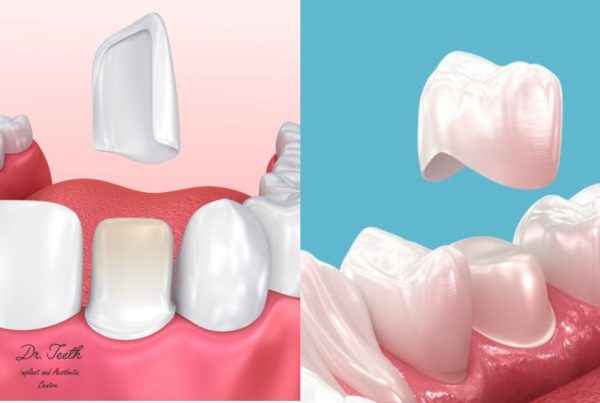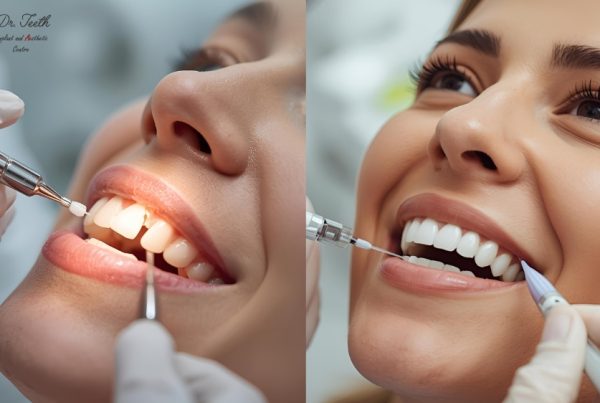When it comes to dental care, two of the most commonly recommended procedures are dental crowns and root canal treatments. But while both are crucial for saving damaged or decayed teeth, they serve entirely different purposes. Confused between the two? You’re not alone. Many patients at Dr Teeth ask us: Do I need a crown or a root canal? Let’s break it down.
This comprehensive guide will help you understand the key differences, individual benefits, and when you might need either a dental crown, a root canal, or both.
What is a Dental Crown?

A dental crown is a tooth-shaped cap placed over a tooth to restore its shape, strength, appearance, and function. It’s often used when a tooth is damaged, cracked, worn down, or heavily filled. Crowns are typically made of:
- Porcelain
- Ceramic
- Metal alloys
- Zirconia
- Or a combination of these materials
Crowns are designed to look, feel, and function like your natural teeth. At Dr Teeth, we offer custom-fitted crowns that perfectly match your smile and bite.
What is a Root Canal?

A root canal treatment (RCT) is a procedure designed to remove infected or damaged pulp (the soft tissue inside the tooth). The pulp can become infected due to:
- Deep decay
- Cracks in the tooth
- Repeated dental procedures
- Trauma or injury
During an RCT, your dentist:
- Removes the infected pulp.
- Cleans and disinfects the canals.
- Fill the canals with a material called gutta-percha.
- Often places a crown on top for protection and structure.
A root canal essentially saves your natural tooth from extraction and relieves pain caused by infection.
Key Differences Between a Dental Crown and Root Canal
| Feature | Dental Crown | Root Canal Treatment |
| Purpose | Restores external structure, aesthetics, and bite function | Treats and removes internal infection or pulp damage |
| Area of Focus | Covers the outside of the tooth | Treats the inside of the tooth (pulp and roots) |
| Function | Acts as a protective shell or cap | Acts as a cleaning and sealing procedure for infection |
| Pain Relief | Not intended to relieve infection-related pain | Provides pain relief from pulp inflammation and infection |
| Material Involved | Porcelain, zirconia, metal, or ceramic | Gutta-percha (biocompatible filler) |
| Structural Reinforcement | Rebuilds and protects weakened tooth | Prepares tooth for a crown post-treatment |
| Procedure Steps | Tooth reshaping, impression, crown placement | Pulp removal, canal cleaning, filling, sealing |
| Time Frame | Usually 2 appointments | 1–2 appointments, depending on infection severity |
| Anesthesia Required | Local anesthesia (mild) | Local anesthesia; sedation optional for anxious patients |
| Risk Level | Low | Moderate (based on canal complexity, infection) |
| Recovery Time | Immediate or same day | 1–3 days with mild soreness |
| Longevity | 10–15+ years with good care | Lifelong if followed by a crown |
| Symptoms That Indicate Need | Chipped, cracked, post-root canal teeth | Pain, swelling, abscess, hot/cold sensitivity |
| Tooth Vitality | Vital or non-vital tooth | Always on non-vital (dead/infected pulp) tooth |
| Aesthetic Role | Improves look, shape, and shade of tooth | Not aesthetic; cosmetic role comes after with crown |
| Cost Factor | ₹3,000–₹20,000 based on material | ₹2,000–₹8,000 excluding crown |
| Use in Combination | Often after a root canal | Often followed by a crown for protection |
| Alternatives | Onlays, inlays, fillings (if minor damage) | Extraction, apicoectomy (if RCT fails) |
| Suitability | Structurally damaged but not infected teeth | Severe decay, infection, or inflamed pulp |
| Associated Risks | Improper fit, gum irritation, crown detachment | Reinfection, canal failure, brittle tooth structure |
When Do You Need a Dental Crown?
You may need a crown when:
- Your tooth has a large cavity and a filling isn’t enough
- A tooth is chipped, cracked, or worn down
- You’ve had a root canal treatment
- A tooth is discolored or misshaped
- You need to anchor a dental bridge
- You have a dental implant needing a cap
Crowns do not remove pain caused by infection, but they protect and restore function to weakened or damaged teeth.

When Do You Need a Root Canal?
A root canal is recommended when:
- There is persistent toothache, especially when chewing
- You have sensitivity to hot or cold that lingers
- The tooth is darkening or turning gray
- There’s swelling or tenderness in the gums
- You see a pimple-like bump on your gum (dental abscess)
- Deep decay has reached the pulp of the tooth
Unlike a crown, a root canal removes infection and saves the tooth from extraction. After the procedure, your dentist may recommend a crown for added protection.
Can You Need Both a Root Canal and a Crown?
Absolutely. In fact, it’s very common.
After a root canal, the tooth becomes brittle and hollow. To prevent it from cracking or breaking, a crown is placed over the tooth. This restores strength, function, and protects it from future damage.
Think of it this way:
Root Canal = Cleaning the Inside
Crown = Protecting the Outside
Benefits of Each Procedure
Benefits of Dental Crowns:
- Restore the function and shape of a tooth
- Improve appearance (color, alignment, size)
- Prevent further damage to a weakened tooth
- Long-lasting with proper care (10–15 years)
- Non-surgical, quick recovery
Benefits of Root Canal Treatment:
- Eliminates infection and pain
- Saves your natural tooth
- Prevents spread of infection to other teeth/gums
- Quick healing (minor discomfort for 1–3 days)
- Avoids tooth extraction and costly replacements
Misconceptions Debunked
❌ “A crown can fix an infected tooth.”
Wrong. A crown doesn’t remove infection. You need a root canal first.
❌ “A root canal is painful.”
Outdated myth. With modern techniques and anesthesia, RCT is virtually painless—just like getting a filling.
❌ “A root canal is an alternative to a crown.”
Not true. They serve different roles. One treats infection, the other protects and restores structure.
Cost Considerations in India
While costs vary by city and clinic, here’s a rough guide:
- Root Canal Treatment (RCT): ₹2,000 – ₹8,000 per tooth
- Dental Crown: ₹3,000 – ₹20,000 depending on the material (Metal, PFM, Zirconia)
At Dr Teeth, we provide affordable treatment plans, with the highest standard of care and infection control. Our team will also guide you on the best crown type suitable for your lifestyle and budget.
Cost Considerations in India
While costs vary by city and clinic, here’s a rough guide:
- Root Canal Treatment (RCT): ₹2,000 – ₹8,000 per tooth
- Dental Crown: ₹3,000 – ₹20,000 depending on the material (Metal, PFM, Zirconia)
At Dr Teeth, we provide affordable treatment plans, with the highest standard of care and infection control. Our team will also guide you on the best crown type suitable for your lifestyle and budget.
Which One is Right for You?
Let’s recap:
| If You Have… | You May Need… |
| Severe pain, decay, infection | Root Canal Treatment |
| A cracked or heavily filled tooth | Dental Crown |
| Both infection & damage | Root Canal + Crown |
| Just cosmetic concerns | Dental Crown |
Still not sure? A proper dental consultation with X-rays is the only way to determine the right course.
Final Thoughts
Both dental crowns and root canal treatments are life-changing procedures that can restore your oral health, confidence, and smile. They’re not competitors—but partners in comprehensive dental care.
At Dr Teeth, we prioritize patient education, pain-free procedures, and lasting results. Whether you need a crown, root canal, or a complete treatment plan, our experienced dentists are here to guide you.












